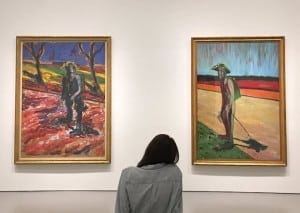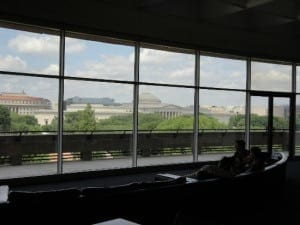
One of the pieces of art critically discussed by artist Hiroyuki Hamadain below. The Smithsonian Magazine describes it as “Cuban artist Reynier Leyva Novo has literally weighed history’s dictatorships. He uses software to measure the weight of ink in the seminal texts by Castro, Hitler and other dictators around the world, which he then paints in correspondingly sized rectangles onto the gallery wall." Slander of socialism and disinformation by false equivalence (the old spurious equation fascism=communism), as if Fidel Castro and Hitler were the same type of leader, with identical programs.
A couple of weeks ago, I drove a 15' truck all day to Maryland. I delivered four of my sculptures and two paintings of mine for an exhibition that opens in September at the University of Maryland gallery.
I graduated from their studio program in 1995. This is probably the first time I went back there since then. I thought I might recognize the way around as I got closer to the art department building, but I didn't. The school has drastically expanded to bury the familiar buildings and scenery. The curator of the show explained to me that the school had to expand to survive financially. He added that, of course, it can't keep expanding forever. Everything went smoothly. Unloading was easy. We returned the truck. The curator and I had a nice chat. He dropped me off at a hotel in the middle of Washington DC so that I'd have the next morning to look around, and then take an Amtrak back to New York. I felt welcomed, and I felt happy and excited about the upcoming show.Next morning, I stepped out of the hotel into the steamy hot summer of Washington DC. I decided to check out the Hirshhorn Museum and Sculpture Garden.
The third floor exhibition was titled Masterworks from the Hirshhorn Collection. I was transfixed by two of Francis Bacon's paintings called Study for a Portrait of Van Gogh. The vibrant colors--reminiscent of Van Gogh's work--that I associate with Van Gogh's warm yet desperate attempt to capture the fragile profoundness of natural beauty immediately shifted to convey Van Gogh's tormented soul as I recognized a disfigured facial expression brushed by Bacon.
However, my psyche, transported to the realm of the mystery of life by those works, was abruptly brought back to a harsh reality of our time. The third floor had a large painting exhibit that was inspired by President Obama's statement, "No matter what happens, the sun will rise in the morning."

Nicolas Party working on the new mural “sunrise, sunset,” at the Hirshhorn Museum and Sculpture Garden (Photo by Cathy Carver)
My heart sunk into bitterness. For those thousands of people who were turned into bits and pieces of flesh and bones by President Obama's predator drones, there were no more mornings. The hardship and death being faced by peoples in seven countries that were bombed under his command would probably elicit devastating rage and sadness on hearing such words.
On the same floor, there was a piece by a Cuban artist. On one side of the large room, you see a huge window framing a grand view of the governmental buildings of Washington DC sprawling outside representing "democracy", "justice" and "freedom". Across from that, you have a wall with five black rectangles varying in sizes. According to the artist, the sizes of the blackness represent the amount of ink used by representative writings of Vladimir Lenin, Adolf Hitler, Fidel Castro, Mao Zedong and Muammar Gaddafi. His statement explains that their texts were accepted as revolutionary at the time, but they all ended up serving "undemocratic" "regimes".
"The Red Army won the war against fascism in Europe as the US hung back and allowed the Soviets and Germans to bleed each other dry. Then the OSS, in the form of Alan Dulles, contrived to save as many Nazi officials as possible to serve as operatives in their coming Cold War against the Soviets. Moreover, a large percent of the US corporate/financial, and industrial elite were Nazi sympathisers who hated communism and admired Nazism, from its racist/anti-semite belief system to his hyper-authoritian ideology e.g., from Prescott Bush to Henry Ford." (4)
But again, back to the art in question. I would like to very briefly talk about Russia, Cuba, Libya and China, which are reduced into black rectangles on a wall along with Nazi Germany.
"While Cuba’s example permeated the consciousness of the youth and revolutionary fighters around the world, U.S. imperialism employed the most monstrous methods of destruction to defeat it, including using biological warfare to wipe out Cuba’s banana crops and to kill an estimated 100,000 pigs, not to mention bombing Cuban hotels and shooting down a commercial aircraft that killed Cuba’s Olympic fencing team and many other passengers." (8)
"No “free press”? Apart from the question of how free Western media is (see the preceding essays), if that’s to be the standard, what would happen if Cuba announced that from now on anyone in the country could own any kind of media? How long would it be before CIA money – secret and unlimited CIA money financing all kinds of fronts in Cuba – would own or control almost all the media worth owning or controlling?
Is it “free elections” that Cuba lacks? They regularly have elections at municipal, regional and national levels. They do not have direct election of the president, but neither do Germany or the United Kingdom and many other countries. The Cuban president is chosen by the parliament, The National Assembly of People’s Power. Money plays virtually no role in these elections; neither does party politics, including the Communist Party, since all candidates run as individuals. Again, what is the standard by which Cuban elections are to be judged? Is it that they don’t have private corporations to pour in a billion dollars? Most Americans, if they gave it any thought, might find it difficult to even imagine what a free and democratic election, without great concentrations of corporate money, would look like, or how it would operate. Would Ralph Nader finally be able to get on all 50 state ballots, take part in national television debates, and be able to match the two monopoly parties in media advertising? If that were the case, I think he’d probably win; which is why it’s not the case.
Or perhaps what Cuba lacks is our marvelous “electoral college” system, where the presidential candidate with the most votes is not necessarily the winner. Did we need the latest example of this travesty of democracy to convince us to finally get rid of it? If we really think this system is a good example of democracy why don’t we use it for local and state elections as well?
Is Cuba a dictatorship because it arrests dissidents? Many thousands of anti-war and other protesters have been arrested in the United States in recent years, as in every period in American history. During the Occupy Movement of five years ago more than 7,000 people were arrested, many beaten by police and mistreated while in custody. And remember: The United States is to the Cuban government like al Qaeda is to Washington, only much more powerful and much closer; virtually without exception, Cuban dissidents have been financed by and aided in other ways by the United States.
Would Washington ignore a group of Americans receiving funds from al Qaeda and engaging in repeated meetings with known members of that organization? In recent years the United States has arrested a great many people in the US and abroad solely on the basis of alleged ties to al Qaeda, with a lot less evidence to go by than Cuba has had with its dissidents’ ties to the United States. Virtually all of Cuba’s “political prisoners” are such dissidents. While others may call Cuba’s security policies dictatorship, I call it self-defense."(9)
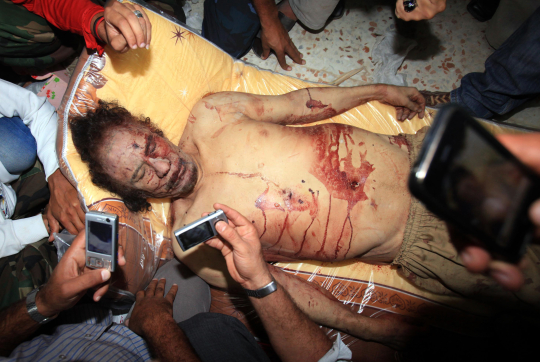
The mutilated body of Muammar Gaddafi. Behind a curtain of sanctimonious lies, the West unleashed its jackals on him and this is their signature. It made Hillary Clinton very happy.
I loved the piece.
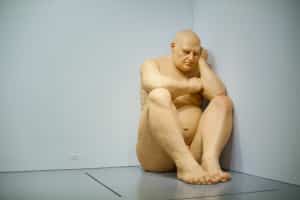 [dropcap]T[/dropcap]he Big Man was big but he was not overpowering. Just enough to say that it was big. In fact, the big white man sat at a corner in a fetal position, totally naked and with a defiant expression on his face.
[dropcap]T[/dropcap]he Big Man was big but he was not overpowering. Just enough to say that it was big. In fact, the big white man sat at a corner in a fetal position, totally naked and with a defiant expression on his face.Much of the second floor was dedicated to Ai Weiwei. One of his main pieces consists of portraits of political prisoners from various countries made out of Lego pieces, spreading on floors in a few large rooms. There were a total of 176 faces on them.

Ai Weiwei’s “Trace” features 176 portraits made from a combined 1.2 million Lego bricks. Photo by Cathy Carver
We see some famous American prisoners among them, such as Edward Snowden, Chelsea Manning or Martin Luther King Jr.
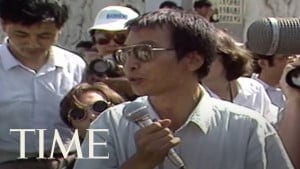
Liu Xiaobo was lionised by the Western press, as "dissidents" from communism always are, the actual reasons for their punishment hidden from view. They are just pawns in the anti-communist defamatory syntax developed by Anglo-American propaganda.
One of the things which motivated me to write about my visit to the museum was Ai Weiwei's ardent support for Liu Xiaobo. The exhibit included a full length Ai Weiwei documentary. In it, Weiwei expresses his unconditional support for Liu's activism. The documentary, however, presented an oddly one dimensional version of Xiaobo focused on his support for "human rights", "freedom of speech", "democracy" and so on.
"Liu’s admirers seldom discuss at length their hero’s other major views. Among other things, he supported the US invasions of Iraq and Afghanistan. He backed the Vietnam and Korean wars even long after they ended, in a 2001 essay. Despite the immeasurable human-rights abuses of those conflicts, Liu stated in his “Lessons from the Cold War” that “the free world led by the US fought almost all regimes that trampled on human rights.” He insisted: “The major wars that the US became involved in are all ethically defensible.” Liu Xiaobo also admired Israel’s positions in the Middle East’s, saying the Palestinians were “often the provocateurs.”"(15)
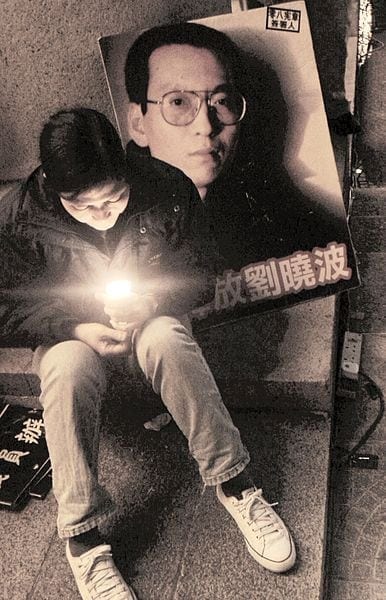
Western propaganda—a refined art and science by now—relies heavily on the manipulation of human emotions. Here's a classical image suggesting the "martyrdom" of a hero persecuted by the evil communists, or whoever Washington wishes to demonise.
[dropcap]O[/dropcap]ur cultural environment is shaped by social institutions, media, political institutions, academic institutions, corporate NGOs, entertainment, arts and so on, which force us to embrace narratives of the moneyed interests. John Steppling, a prominet playwright, thinker and philosopher, describes that such a tendency results in a fictitious "backdrop" behind us, which in turn shapes the narratives of our social discourse, while creating willing agents for the establishment. From his recent writing:
"If one *reads* only backdrop, and not a world, how much easier it is to ignore real worlds. Yemen, a massive war crime taking place in real time is ignored. It is not even backdrop, for the backdrop is one manufactured by media — one that also shapes the subject position of those doing the ignoring. And one aspect of this is to shape dissent — a faux dissent in which a *new* left, branded and capitalized, in their guise as reasonable and adult, make sure to police real dissent more ruthlessly than even conservatives or liberals. This is the left that makes sure to denigrate Chavez and Maduro, to label Syria a *regime* and laugh at those crazy North Koreans. For this is proof that they have a seat at the table of reality."(18)
HIROYUKI HAMADA—As we face the impending risk of nightmarish nuclear wars and climate change, our predicament is as obvious as the illegitimacy of the system imposing its framework of corporatism, colonialism and militarism on peoples as colonial wars, police violence, mass incarceration, austerity measures, elimination of legal protection and human rights violations. And the ones who are domesticated in the gated communities of privilege and exceptionalism are deprived of their humanity to feel the pain of “others” and their essential capacity to explore what it is to live as humans.

This work is licensed under a Creative Commons Attribution-NonCommercial 4.0 International License.
[premium_newsticker id=”154171″]
Parting shot—a word from the editors
The Best Definition of Donald Trump We Have Found
 In his zeal to prove to his antagonists in the War Party that he is as bloodthirsty as their champion, Hillary Clinton, and more manly than Barack Obama, Trump seems to have gone “play-crazy” -- acting like an unpredictable maniac in order to terrorize the Russians into forcing some kind of dramatic concessions from their Syrian allies, or risk Armageddon.However, the “play-crazy” gambit can only work when the leader is, in real life, a disciplined and intelligent actor, who knows precisely what actual boundaries must not be crossed. That ain’t Donald Trump -- a pitifully shallow and ill-disciplined man, emotionally handicapped by obscene privilege and cognitively crippled by white American chauvinism. By pushing Trump into a corner and demanding that he display his most bellicose self, or be ceaselessly mocked as a “puppet” and minion of Russia, a lesser power, the War Party and its media and clandestine services have created a perfect storm of mayhem that may consume us all.— Glen Ford, Editor in Chief, Black Agenda Report
In his zeal to prove to his antagonists in the War Party that he is as bloodthirsty as their champion, Hillary Clinton, and more manly than Barack Obama, Trump seems to have gone “play-crazy” -- acting like an unpredictable maniac in order to terrorize the Russians into forcing some kind of dramatic concessions from their Syrian allies, or risk Armageddon.However, the “play-crazy” gambit can only work when the leader is, in real life, a disciplined and intelligent actor, who knows precisely what actual boundaries must not be crossed. That ain’t Donald Trump -- a pitifully shallow and ill-disciplined man, emotionally handicapped by obscene privilege and cognitively crippled by white American chauvinism. By pushing Trump into a corner and demanding that he display his most bellicose self, or be ceaselessly mocked as a “puppet” and minion of Russia, a lesser power, the War Party and its media and clandestine services have created a perfect storm of mayhem that may consume us all.— Glen Ford, Editor in Chief, Black Agenda Report




